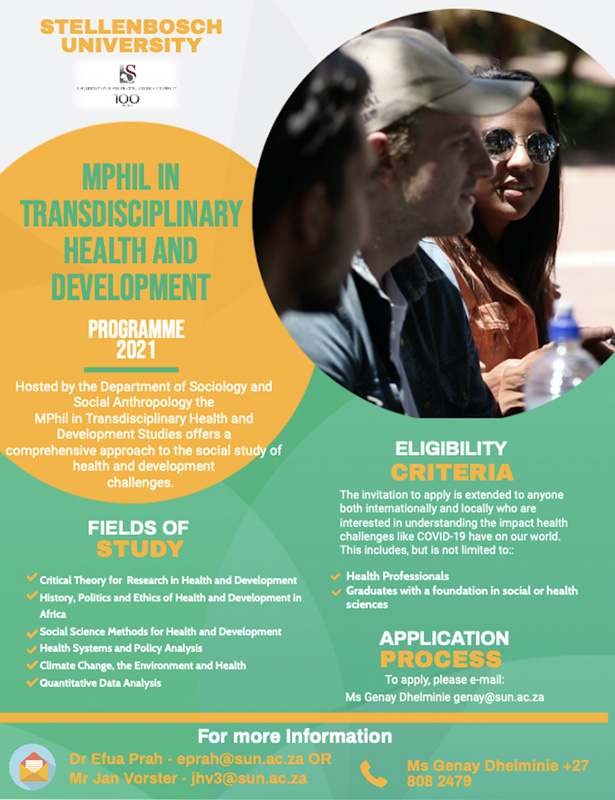Masters
MA in Sociology or Social AnthropologyThe MA programme offers students the opportunity to develop a structured research programme on a selected topic at a more advanced level than the Honours programme, drawing on the theoretical and methodological traditions within the disciplines of either Sociology or Social Anthropology.
Programme aims:
The programme is an essential step along the career path of academics and researchers and will also be of benefit to social analysts, planners, developers and consultants, as well as to those working professionally in specific fields, such as government, health, development, education, the environment, social policy, gender programming and the media.
Students are expected to develop and demonstrate the conceptual and research skills necessary for the study of society and human relations at an advanced level, while deepening their knowledge of and insight into society, including from a comparative perspective. The focus is on deepening the student‟s grasp of the theoretical and methodological foundations of Sociology or Social Anthropology as well as his/her ability to apply sociological or social anthropological theory, analysis and research methodology in a selected field of study.
Here’s how it works…
Programme design
Candidates obtain a MA degree in either Sociology or Social Anthropology primarily by research thesis. The programme involves a minimum of one year fulltime study, although a period of 18 months to two years is more common and students are urged to budget their time accordingly. Arrangements can be made for part-time study.
In the first semester of registration the student must define his or her research topic and develop a suitable research proposal to guide the research in consultation with a designated supervisor. A guide for the development of a Masters proposal is available from the Department.
In support of this work students attend an orientation programme and take one module (871) intended to: (1) provide a general induction to the MA programmes, staff members’ research interests, the student-supervisor relationship, the examining process, departmental progress reporting requirements, ethics approval processes, as well as the technical requirements of a research proposal and writing a MA thesis; and (2) deepen the student‟s intellectual engagement with the theoretical and methodological underpinnings of research and research design at this level.
Failure to complete this module successfully may lead to the student being asked to withdraw from the programme.
Once the module is completed and a suitable research proposal has been developed, the students are expected to begin their research, normally by the start of the second semester of their first year of registration. The final output is a research thesis of approximately 40 000 words (excluding references and appendices); technical requirements are set out in Section 5.7 of the University Calendar.
The option of undertaking a pure research thesis without taking the support module may be considered under exceptional circumstances, upon motivation to the programme coordinator.
The supervisory relationship
With both options, the student is assigned a thesis supervisor who provides individual guidance. Students are expected to initiate appointments/discussion with their supervisors, prepare inputs and written drafts of chapters, receive comments on assignments and also report on their progress orally and in written format, including via e-mail. The supervisor’s responsibilities are to give the student advice related to the conceptualisation and design of his/her research project as well as give both written and oral feedback and comments on student work that is submitted.
It is important for students and supervisors to keep in regular contact; a rule of thumb is that on average there should be a substantive meeting or set of communications between student and supervisor every 4 – 6 weeks, or more frequently by mutual arrangement. It is also important for students to appreciate that academic staff have many other commitments and to plan their programme accordingly, especially when it comes to meeting university procedures and deadlines around submitting their work for examination. A rough rule of thumb is that staff can be expected to provide feedback within three weeks of receipt of material from their students, unless otherwise negotiated.
When it comes to the final draft of the thesis, students should be prepared to present their completed draft for final review by their supervisors no later than four weeks before the official submission date to the Postgraduate Examination Office, if they wish to meet that deadline. The Department encourages the negotiation of an individual supervisory contract between supervisor and student at the start of the supervisory relationship.
Content of the research thesis
The specialisation area of a student depends on the interest of the student and the availability of lecturers to supervise the particular topic. Students are urged to familiarise themselves with the research specialisations of staff in the Department and to explore
opportunities to link their MA studies to on-going research programmes within the Department. However, the Department also welcomes well-motivated ideas and proposals from prospective students on other topics, provided that the necessary expertise is available to offer sound supervision.
Assessment
The thesis is worth 180 credits and is examined by both an internal and an external
examiner in accordance with University rules.
Progress Report
In addition to feedback to students in individual modules, the Department reviews student progress on an annual basis by means of a Progress Report that is completed by both the student and his/her supervisor. This Report affords both students and supervisors an opportunity to reflect on the academic progress of the individual student and identify any issues or problems requiring follow-up or attention, including from the side of the Department. Failure to demonstrate satisfactory academic progress may result in the Department not recommending that a student be allowed to re-register for the programme the following year.
Programme co-ordinators
Social Anthropology:
Prof Steven Robins
Tel: +27 21 808 2090
E-mail: slr@sun.ac.za
Sociology:
Prof Lindy Heinecken
Tel: +27 21 808 2095
E-mail: lindy@sun.ac.za


